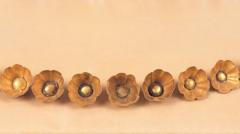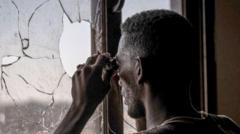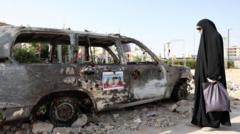The ongoing war in Sudan has severely impacted the National Museum, resulting in immense loss of artifacts and cultural identity. Amidst the aftermath of violence, museum officials and researchers are fighting to restore what remains of Sudan's rich historical heritage.
Sudan's National Museum: A Legacy Lost Amidst War's Destruction

Sudan's National Museum: A Legacy Lost Amidst War's Destruction
Years of conflict in Sudan have not only devastated lives but have also led to the tragic looting and destruction of the nation's priceless cultural heritage at its National Museum.
The Sudan National Museum, once a proud symbol of the nation’s ancient civilizations, now stands in ruins, a stark reminder of the destruction wrought by two years of conflict. Not long ago, the magnificent grounds, adorned with striking sculptures of rams and lions from Nubian history, attracted both schoolchildren and tourists alike. However, since armed conflict erupted two years ago, the landscape has changed dramatically, with the museum suffering extensive damage as the military reclaimed control from the rival Rapid Support Forces (RSF).
The full extent of the devastation has become apparent, as government officials report that tens of thousands of artifacts have either been destroyed or looted during the RSF's control of Khartoum. "They destroyed our identity, and our history," said Ikhlas Abdel Latif Ahmed, director of museums at the National Corporation for Antiquities and Museums, during an interview on BBC's Newsday. The museum, situated in central Khartoum near the Presidential Palace, previously showcased the rich tapestry of the region's extensive history. But today, it bears the scars of violence - shattered glass, spent bullet casings, and the lingering effects of looting.
Previously, the museum was undergoing renovations, which may have facilitated the removal of its treasures. As the RSF faced accusations of smuggling artifacts to the UAE, such as gold items dating back to ancient Egypt, the future of these invaluable pieces hangs precariously in uncertainty. Ahmed lamented the loss of items like a gold collar from the pyramid of King Talakhamani, asserting, "There is no value for the museum artefacts; it's more expensive than you could imagine."
The Sudanese government now plans to reach out to Interpol and UNESCO in hopes of recovering the stolen artifacts. However, many observers believe that this endeavor might prove dangerous and fraught with challenges, especially given the ongoing conflict. Critics suggest that the RSF’s strategic targeting of cultural sites reflects a deliberate effort to erase Sudan's rich heritage, undermining the state’s very identity.
In a poignant statement, Amgad Farid, director of the Fikra for Studies and Development, expressed concern over the cultural losses: “This is not an incidental loss amid conflict; it is a calculated endeavor to erase Sudan's legacy." The suffering extends beyond cultural loss, as the war has displaced nearly 13 million people and led to an estimated 150,000 fatalities.
As the museum and its remaining treasures await restoration, Ahmed remains hopeful. “Inshallah [God willing], we will get all our collections back,” she vowed, expressing her desire to rebuild Sudan's cultural heritage even more beautifully than before.























